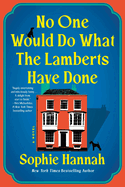
It might be true that no one would do what the Lamberts have done, as the title of Sophie Hannah's contemporary mystery suggests, but it's equally true that the Lamberts have, in fact, done it. It's just not entirely clear what exactly "it" is, which forms the crux of Hannah's impossibly clever murder mystery as she explores just how far a family might go to protect one of their own.
Detective Connor Chantree is in receipt of... something. A document? A manuscript? A book, perhaps, or a "spruced-up rectangularized heap" of a story he's managed to assemble out of the box of "maimed and defeated pages" he's been sent by an unknown person. Whatever "it" is, it offers new details into the closed case of Tess Gavey, the teen whose autopsy "ruled out any deliberate action," though her death remained something of a mystery even to the detectives assigned to it months earlier.
The rest of No One Would Do What the Lamberts Have Done is presented within this frame, presumed to be the content of those mysterious pages. Written almost entirely by an unidentified narrator (yet another puzzle to solve within the novel), the pages tell the story of "the Lambert-Gavey War" and the gruesome and shocking way it ended.
It begins like any normal June day: Sally Lambert is singing made-up Champ-themed songs to Champ, the family's dog, when she is interrupted by the doorbell and finds a policeman who's come to discuss Champ himself. The officer explains that the Gaveys--also known as the Lambert's sworn enemies, with a matriarch Sally considers to be "Satan-adjacent"--have accused Champ of biting their daughter, Tess, and that police will be investigating what may become of--to Sally--"completely, indisputably innocent" Champ. But--no. "That cannot be allowed to happen. Can't be considered, let alone tolerated, as a possibility." And so, like any good mother, Sally moves directly into protective mode. She and the family, she decides, will go on the run, hiding from the police, from the Gaveys, from any possibility that Champ may be removed, harmed, or killed.
From this premise, No One Would Do What the Lamberts Have Done becomes something of a fugitive novel, a story of refuge and revenge, a convoluted tale with surprises at every turn. At its heart, the novel is both deeply funny ("I do feel like we're all kind of... trapped in an irrational, menopausal panic attack, maybe?") and also rather dark, with Sally unable to trust anyone around her and willing to do just about anything--legal or not--to protect Champ. The Gaveys, she reasons, "should be, must be, punished for all the things or else it won't be proper."
Hannah (The Monogram Murders; The Couple at the Table) addresses this paradox head-on within the text itself, as our unnamed narrator explains the absurdity impediment: "I can't give you any excuse to say, 'Oh, come on, that's absurd!' and dismiss my story." And yet, in some way, that's exactly what happens: readers follow the Lamberts across the country on a haphazard road trip, complete with burner phones and unexpected accomplices along the way, with laugh-out-loud moments of seemingly ridiculous goings-on threatening to hide the very real, very emotional plot pulsing beneath the humor.
What could be funnier than a family on the run from the law, fully aware that no one is chasing them? "This isn't an international manhunt, or even a national dog-hunt," Sally's husband tells her. "It's not a hunt at all. No one's looking for us, as far as we know. I'm not convinced anyone official is even aware Champ isn't at home." But that, Sally knows, is not the point. The family's security has been "compromised," and home is no longer the safe haven it needs to be for them. "It turns out there's no such thing as having a grip on life; doesn't he realize?" And what could be more dangerous than a mother pushed to the edge to protect her family, with nothing left to lose except those she loves the most? "What [others] were loudly proclaiming no one would do, the Lamberts of Swaffham Tilney, Cambridgeshire, had demonstrably done. And, what's more, we couldn't have done it to any greater degree or a single jot more comprehensively than we had."
Hannah is no stranger to complicated mysteries: she's written numerous standalone thrillers and multiple Hercule Poirot novels authorized by Agatha Christie's estate. But she considers No One Would Do What the Lamberts Have Done to be one of her most personal projects, with Champ inspired by her own Welsh Terrier, Chunk, and the story influenced by how strongly she feels that her dog is a full-fledged member of her family. This entry point grounds No One Would Do What the Lamberts Have Done in the humanity of its key players, inviting readers into a novel that is as smart as it is heartfelt. Dog lovers will rejoice, and eagle-eyed clue-seekers will delight in the unexpected twists and turns throughout. Hannah has crafted an emotionally believable tale that will leave readers guessing to the very end, a perfectly plotted whodunit (or who done what) that is both Christie-esque in its cluing and yet wholly original in its execution. --Kerry McHugh

